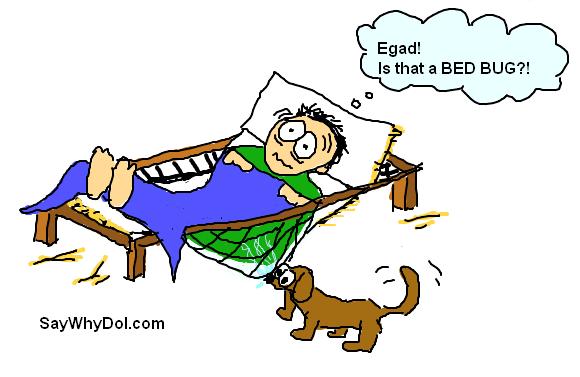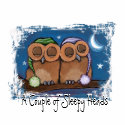Good night, sleep tight,
Don’t let the bedbugs bite,
Wake up bright
In the morning light
To do what’s right
With all your might.
- Nursery Rhyme
“Sleep tight!” is an oft-heard wish before bedtime, but why do we say it? What is the meaning of “Sleep Tight”?
Theories, Theories, Theories!
As is often the case with etymology, there are many theories behind every question.
Theory 1: “Sleep tight” wishes your bed ropes are tight
If you go back in history back to the 16th and 17th centuries, mattresses were usually stuffed with straw or down, and were placed on top of beds that were made by stretching inter-woven ropes in a lattice-like weave across a bedframe. Every few nights the ropes would loosen under the body weight, making the bed less comfy. So these slackened ropes had to be tightened every now and then with a special tool to ensure optimal comfort and therefore a good night’s sleep.

I really like this theory but sadly it doesn’t line up well with the time that the phrase “Sleep tight” was first used. When the phrase first appears in text, it was in 1866, in Susan Bradford Eppes’ diary, Through Some Eventful Years, and during these times beds were no longer made from ropes and frames. The mattress cane-box beds had already come and gone and box-spring beds were well on their way to becoming widespread. So it seems this theory may not be the true origin of Sleep Tight.
Theory 2: “Sleep Tight” alludes to the need to tuck your bedclothes in tightly to avoid bedbugs
Although the “Sleep tight” phrase is often followed by “Don’t let the bed bugs bite!”, which would suggest that this theory is plausible, etymologists have found that the bed bug bite reference was added much later, so is likely not connected to the phrase “sleep tight”.
Another reason why this theory is unlikely is that tucking bedclothes tightly would not prevent mattress-aboding bed bugs from getting at you!
Theory 3: “Sleep Tight” meaning “Sleep securely”
Just as a water-tight vessel is secure from water flooding in, and as an air-tight container is undisturbed from the entrance of air, to sleep tight may be a wish to sleep securely, without letting anything disturb you.
However as Brent pointed out below in the comments, water-tight and air-tight seem to allude to keeping these things OUT rather than in, so sleep-tight might by similar logic indicate keeping sleep out.
It seems that most etymologists prefer the third theory although it seems all three theories have certain flaws which makes the phrase “sleep tight” still somewhat mysterious in it’s precise origins.
Related articles
See other articles in the etymology category including:
- Jet Black: Why do we say something is “jet black”?
- Limelight: Why do we say someone is “in the limelight”?
- Love (tennis): Why do I say “love” instead of “zero” in tennis?
- OK: Why do I say “OK”? What does OK stand for?
- Pitch Black: Why do we say something is “pitch black”?
Note:
This site is working in affiliation with Amazon.com (for USA visitors) and Zazzle. If you like a product that was recommended anywhere on this website, please consider buying these products via the links on this site, to help keep this website running. Thanks ![]()











There is certainly lots of excellent material on this excellent website.
I’ve seen many questions like this on the Internet, and all seem to decompose the phrase and address the origin and meaning of “sleep tight”. They answer WHAT it is instead of WHEN the idiom was first used. In searching Google Books, the earliest reference to the specific idiom “Good-night, sleep-tight, don’t let the bedbugs bite” I found is in the 1896 first publication the book of humor titled “What They Say in New England: a book of signs, sayings, and superstitions” by Clifton Johnson.
Thanks for that useful tidbit Phil I found an earlier reference of “sleep tight” alone in 1866, in Susan Bradford Eppes’ diary, “Through Some Eventful Years”. I should imagine it might have been said orally before this though, even if textual evidence has not yet been found.
I found an earlier reference of “sleep tight” alone in 1866, in Susan Bradford Eppes’ diary, “Through Some Eventful Years”. I should imagine it might have been said orally before this though, even if textual evidence has not yet been found.
However the last explanation doesn’t seem right cuz if we follow the logic, sleep tight means secure from sleeping no?
Good point. I guess if the expression was “wake-tight” it would make more sense.
While ‘water tight’ and ‘air tight’ might mean to not let something leak in, it also means not to let the contents of a container escape or leak out, so sleep tight could mean, don’t let sleep escape you.
Could it be that a drunken sleep is easy to accomplish and therefor the termanolgy for drunken sleep may be …..sleep tight . tight being another word for drunkeness
It’s from the nederlandse ‘slaap zacht’, meaning sweet dreams or sleep gently. Welterusten! Slaap lekker.
Maybe sleep tight is just safely tucking someone into bed
As a parent does
My family have experienced the old time way or you can say the good old days.
They had a mattress made of cotton and they called it a tick. Over a period of time the cotton started getting infested with bed bugs. This allowed them to know when it’s time to replace their mattress.